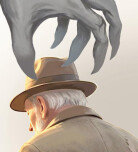Ax for the frozen sea
Ax for the frozen sea
Posted December. 15, 2021 07:41,
Updated December. 15, 2021 07:41

Some stories just continue to make people uncomfortable, regardless of time. Shirley Jackson’s short story “The Lottery,” published in 1948, is one of them. The story of a terrible misfortune being selected in the lottery was shocking.
The community described in the story gathers in a square every June to pick out a scrape goat. No one is an exception, and drawing is based on a belief that it needs to be done to ensure good harvest and life. The people draw lots and the person who gets the marked piece of paper is stoned to death. This year, a woman who was late to the event was drawn. She is the mother and wife to a family. People begin to throw stones at the woman who cries out. A woman picks up a rock that is large enough to lift with both hands. Children also join the violence.
It was a horrific story. When Jackson first published the story in the New Yorker, people were appalled. The magazine received hundreds of letters and calls. Even the writer’s mother expressed her discomfort in a letter. “Your father and I strongly disapprove of your story published in the New Yorker. Why don’t you write more pleasant stories?” It was a story that even made the writer’s parents uncomfortable.
The story is known today as one of America’s finest short stories, but it still makes people uneasy. The reason is that it nudges a feeling we know all too well. We encounter situations where we turn others into scapegoats as depicted in the story, but we are not as aware of its brutality and violence of the action due to the “frozen sea” within us. Thus art, as Kafka said, should be “the ax for the frozen sea within us,” as it would create holes and cracks to reveal the contradiction and brutality within us. To look back on wrongdoings of the past and repent. This is the reason why the discomfort in Jackson’s eerie story is valuable.





![[단독]윤영호 “인수위서 尹 독대…尹 당선 안되면 미국 이민가려 했다”](https://dimg.donga.com/c/138/175/90/1/wps/NEWS/IMAGE/2025/12/25/133037156.1.jpg)

